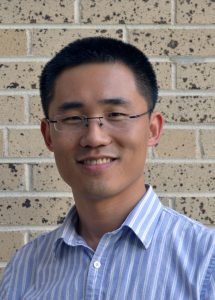 |
Assistant Professor B.Sc., Zhengzhou University (2006) Ph.D., University of Tennessee at Knoxville (2012) |
Research Interests
We are interested in a broad range of topics in theoretical condensed matter and materials physics, with a special focus on the roles played by spin-orbit coupling. Spin-orbit coupling is a relativistic effect that connects the internal SU(2) degree of freedom of electrons with their orbital motion which is coupled to U(1) gauge fields, and consequently makes behaviors of electrons or other quasiparticles of electronic origin much richer than their spinless counterparts. Spin-orbit coupling has been conventionally assumed to be a small effect in solid state systems, but this view has been constantly challenged in recent decades, as a plethora of interesting phenomena have been shown to be directly related to spin-orbit coupling, e.g., anomalous Hall effect, spin Hall effect, topological insulators, and topological superconductivity, etc. Some of our recent research topics along these lines are:
- Noncollinear magnetism. We predicted, based on simple symmetry arguments, that the anomalous Hall effect (AHE) can exist in certain noncollinear antiferromagnets with vanishing total magnetization [1], which was experimentally verified recently. This discovery counters the century-long conventional wisdom that the AHE is proportional to total magnetization and therefore should vanish in antiferromagnets. We are generically interested in any new physics due to complex magnetic orderings that cannot be represented by slowly varying pseudo vectors, as well as noncollinear quantum spin systems that do not have long-range orders. We are also interested in the dynamics of the noncollinear spins and the influence of external electromagnetic fields on it.
- Topological superconductivity. In a collaboration with experimentalists we identified Fe atomic chains on Pb substrates as a practical system for realizing Majorana fermions [2], which are a special type of quasiparticles being their own complex conjugates. Majorana fermions and other non-Abelian quasiparticles are promising candidates for topological quantum computation, in which gate operations can be achieved by braiding these quasiparticles. We are interested in finding new systems that can host these exotic quasiparticles, as well as understanding their behaviors under external perturbations. We are also interested in fundamental problems of low-dimensional superconductors with strong disorder and spin-orbit coupling [3].
- Low-dimensional materials. We found that the low-energy Hamiltonian of graphene can inherit a special form of spin-orbit coupling from a neighboring transition metal dichalcogenide layer [4]. We are interested in emergent phenomena in moiré structures formed by stacking two-dimensional materials together, as well as topological properties of low-dimensional systems.
Selected Publications (See Google Scholar for a complete list)
- Hua Chen, Qian Niu, and Allan H. MacDonald, “Anomalous Hall effect arising from noncollinear antiferromagnetism”, Phys. Rev. Lett. 112, 017205 (2014)
- Stevan Nadj-Perge*, Ilya K. Drozdov*, Jian Li*, Hua Chen*, Sangjun Jeon, Jungpil Seo, Allan H. MacDonald, B. A. Bernevig, and Ali Yazdani, “Observation of Majorana Fermions in Ferromagnetic Atomic Chains on a Superconductor”, Science 346, 602 (2014)
- Hyoungdo Nam, Hua Chen, Tijiang Liu, Jisun Kim, Chendong Zhang, Jie Yong, Thomas R. Lemberger, Philip A. Kratz, John R. Kirtley, Kathryn Moler, Philip W. Adams, Allan H. MacDonald, and Chih-Kang Shih, “Ultrathin two-dimensional superconductivity with strong spin-orbit coupling”, Proceedings of the National Academy of Sciences, 113, 10513 (2016).
- Zhe Wang, Dong-Keun Ki, Hua Chen, Helmuth Berger, Allan H. MacDonald, and Alberto Morpurgo, “Strong interface-induced spin-orbit coupling in graphene on WS2“, Nature Communications 6, 8339 (2015).
